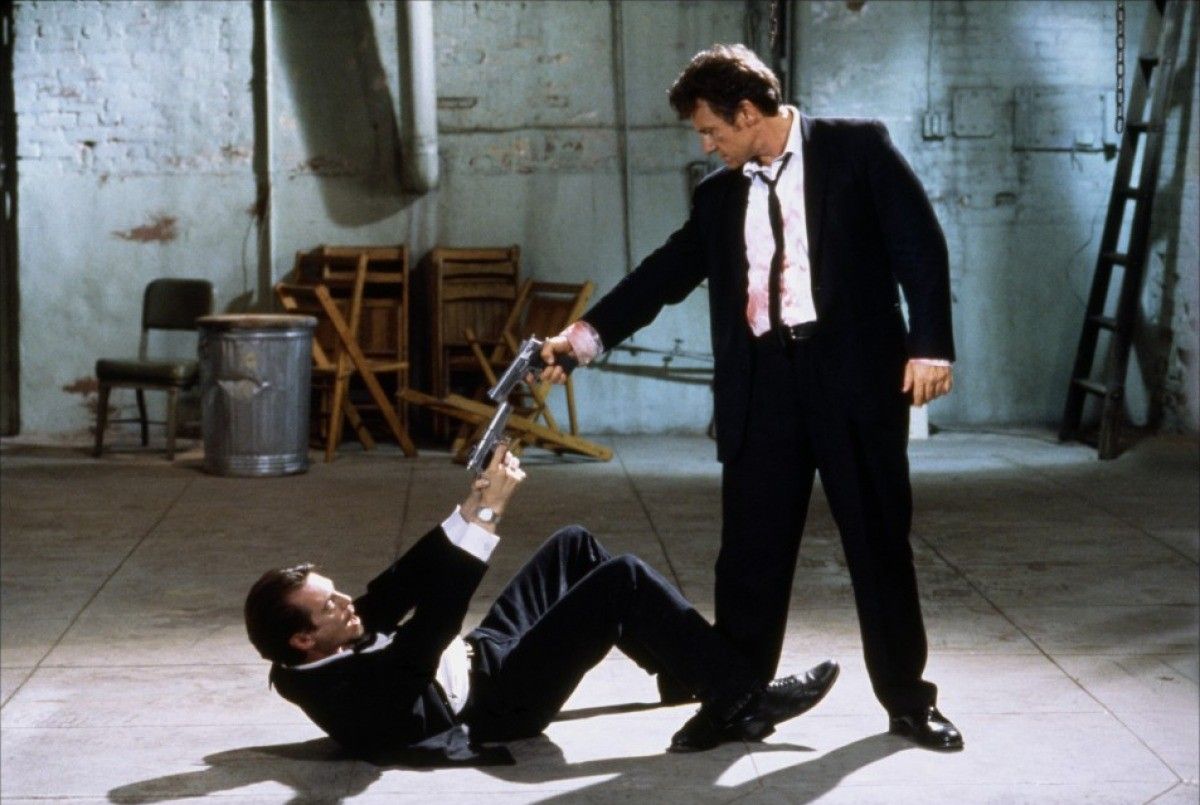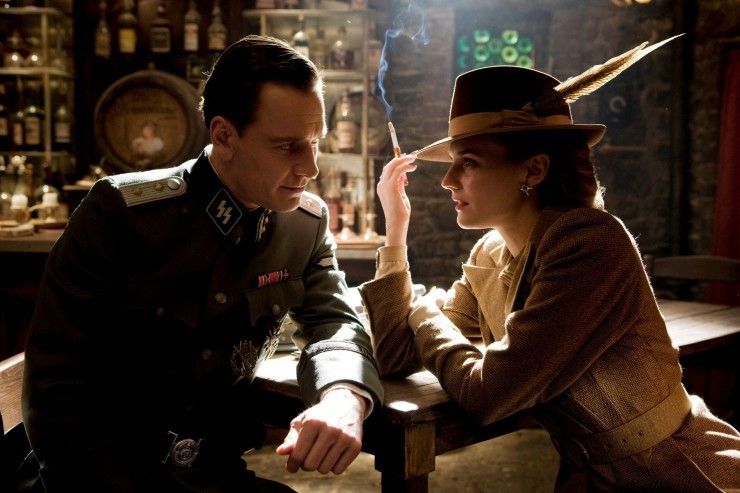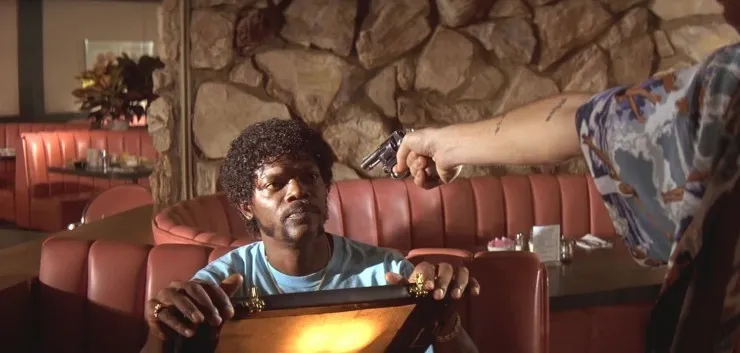
Looks like we're in a Mexican standoff with different facets of this storytelling trope.
One of my favorite storytelling tropes is when you have characters with their backs against the wall, with nothing left to do but try to fight their way out. These situations have a particular name and function within entertainment—the Mexican standoff.
I bet you can picture a scene like this in your head. Three or more characters, all with weapons pointed toward one another, and there's no way out. Welcome to the Mexican standoff definition.
Today, we're going to go over this trope, learn how we refer to it today, and look at some examples of standoffs in movies and TV shows.
Sound good? Get ready to draw your weapon.

What Is a "Mexican Standoff"? Showdowns in Film & TV
I want to say that, nowadays, to be politically correct and to have sensitivity toward words that may frame cultures in a negative light, we call these scenes "standoffs" in movies and TV. As we get deeper into the definition, we'll learn the etymology of the phrase.
The reason we refer to it as a "Mexican standoff" for parts of this article is that it's the term most people search for when they want to gather this information, and we title and explain based on that, so Google knows to take them to us. We hope they find this article and the vernacular changes.
So let's get into the standoff definition.

"Mexican Standoff" Definition
A Mexican standoff is a confrontation between three or more characters in which no single party achieves victory because each has a deadly weapon pointed toward them. In these scenes, when any one person pulls the trigger, the others will follow, mortally wounding one another.
Because of the weapons, no party in this standoff can retreat, so a violent ending is a foregone conclusion.

Why Is It Called a Mexican Standoff?
Like we said earlier, most people just call it a "standoff" now. But the term actually dates back to around the Mexican-American War and might have been used to define soldiers or robbers of the time.
The phrase first appeared in print in March 1876 in a short story titled Sunday Mercury, in which an American character is being robbed by a Mexican character. It was written by F. Harvey Smith, and you can read his words below.
"Go-!" said he sternly then. "We will call it a stand-off, a Mexican stand-off, you lose your money, but you save your life!"
Mexican Standoff Examples in Film and TV
When it comes to film and television, these standoffs have been tropes since cameras could roll. I mean, what better way to put your character in an impossible position than to have danger coming from any angle?
We'll get into the most famous Mexican standoff in the next section, but for now, let's check out some other popular topics.
Quentin Tarantino has three epic scenes like this in Reservoir Dogs, Pulp Fiction, and Inglourious Basterds. The Reservoir Dogs one occurs at the end of the movie, as characters accuse one another of being a cop. It gets to a heated place until triggers are pulled, and everyone winds up dead at the end.
In Inglourious Basterds, we have a shootout at an underground bar where there is only one survivor. People have guns pointed under the table and above the table, plus knives. It's a really messy scene that builds tension and character, and bids farewell to some of the people we love in the story.
In Pulp Fiction, we see this happen in the diner, when Jules actually talks everyone down with no one getting killed, subverting his own ending from Reservoir Dogs.
A funny version of this situation comes from the minds of Key & Peele, who lampoon these situations in a constantly escalating situation where two people reveal things no one else knows, as well as weapons they have trained on one another. It's a brilliant takedown of a scene we've seen many times.
Video is no longer available: www.youtube.com/watch?v=IHQr0HCIN2w
Mexican Standoff Scene in The Good, the Bad, and the Ugly
The most famous standoff of all time comes from Sergio Leone's 1966 Western The Good, the Bad, and the Ugly. Our titular characters, played by Clint Eastwood, Lee Van Cleef, and Eli Wallach, face each other at gunpoint in front of a grave full of gold.
In this scene, we see the editing and rotating camera building tension. We want our good guy to make it out alive, but we have no idea how. And this revolving bartering of each character to team up also has lots of implications in the story. It's an intense scene that is so well-directed, shot, and edited it feels like a film school in five minutes.
Summing Up "What is a 'Mexican Standoff'? Showdowns in Film & TV"
Now that you know all about these kinds of scenes, it's time to try them out in your writing and directing. Remember, the best versions of these scenes build tension, raise the stakes, and surprise the audience with the consequences.
What are your favorite examples of standoffs in movies and TV? Any strategies you would suggest to other writers and directors for making them?
Let us know in the comments.
Your Comment
2 Comments
I have NEVER EVER heard anyone EVER refer to a Mexican standoff as a "standoff." A standoff is a broadly defined situation that can involve anything from water balloons or tea cups to whole armies and atom bombs! A Mexican standoff is very specific... people pointing GUNS point blank at each other with mutually assured death on the line.
Expressions are coined without concern for political correctness. This article pretends that more evolved people have dropped the word Mexican in this case. They have not.
Russian Roulette is obviously something very different from Roulette. A Columbian Necktie is not an article of clothing. Are these expressions culturally insensitive? Perhaps. But let's not pretend such phrases have been modernized when they haven't.
NFS went almost a month without ass-kissing Quentin Tarantino. At least this blurb remedied that. Oh wait... "ass-kissing" is not PC. Perhaps you can offer a more politically correct way of describing it?
December 25, 2022 at 8:50AM
You do realize that there is nothing politically incorrect or insensitive about the term "Mexican," right? Would you be attempting to change the terminology if it were called an American or British Standoff? I doubt it.
December 31, 2022 at 5:28AM